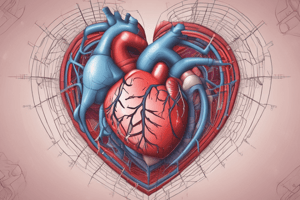Podcast
Questions and Answers
What is a common lifestyle factor that contributes to heart failure?
What is a common lifestyle factor that contributes to heart failure?
- Good sleep habits
- Smoking (correct)
- Healthy diet
- Regular exercise
Which of the following symptoms is often associated with heart failure?
Which of the following symptoms is often associated with heart failure?
- Muscle cramps
- Severe headache
- Fatigue (correct)
- Stomach pain
What is a diagnostic test used to evaluate the heart's structure and function in heart failure?
What is a diagnostic test used to evaluate the heart's structure and function in heart failure?
- Liver function tests (LFTs)
- Echocardiogram (correct)
- Complete blood count (CBC)
- Electrolyte panel
What is a type of medication commonly used to treat heart failure?
What is a type of medication commonly used to treat heart failure?
Which of the following is a key aspect of preventing heart failure?
Which of the following is a key aspect of preventing heart failure?
What is a primary cardiac cause of heart failure?
What is a primary cardiac cause of heart failure?
Which symptom of heart failure is often accompanied by weight gain?
Which symptom of heart failure is often accompanied by weight gain?
What is the main purpose of a chest X-ray in diagnosing heart failure?
What is the main purpose of a chest X-ray in diagnosing heart failure?
Which medication is commonly used to treat heart failure by reducing blood volume?
Which medication is commonly used to treat heart failure by reducing blood volume?
What is a key lifestyle change recommended for patients with heart failure?
What is a key lifestyle change recommended for patients with heart failure?
What is a common blood test used to diagnose heart failure?
What is a common blood test used to diagnose heart failure?
Which of the following is a non-cardiac cause of heart failure?
Which of the following is a non-cardiac cause of heart failure?
What is a device used to regulate heart rhythm and prevent sudden death in heart failure patients?
What is a device used to regulate heart rhythm and prevent sudden death in heart failure patients?
Which of the following can help prevent heart failure?
Which of the following can help prevent heart failure?
What is a key aspect of diagnosing heart failure?
What is a key aspect of diagnosing heart failure?
Study Notes
Causes of Heart Failure
- Cardiovascular conditions:
- Coronary artery disease (CAD)
- Heart valve problems (e.g., mitral regurgitation)
- High blood pressure (hypertension)
- Cardiomyopathy (dilated, hypertrophic, or restrictive)
- Lifestyle factors:
- Smoking
- Excessive alcohol consumption
- Physical inactivity
- Obesity
- Medical conditions:
- Diabetes
- Kidney disease
- Anemia
- Thyroid disorders
- Infections:
- Viral myocarditis
- Bacterial endocarditis
Symptoms of Heart Failure
- Shortness of breath (dyspnea)
- Fatigue
- Swollen legs, ankles, and feet (edema)
- Rapid or irregular heartbeat
- Coughing or wheezing
- Chest pain or discomfort
- Dizziness or lightheadedness
- Loss of appetite
- Nausea and vomiting
Diagnosis of Heart Failure
- Medical history and physical examination
- Electrocardiogram (ECG or EKG)
- Echocardiogram
- Chest X-ray
- Blood tests:
- B-type natriuretic peptide (BNP) level
- Complete blood count (CBC)
- Electrolyte panel
- Liver function tests (LFTs)
- Cardiac catheterization (optional)
Treatment of Heart Failure
- Medications:
- Angiotensin-converting enzyme (ACE) inhibitors
- Beta blockers
- Diuretics
- Inotropes
- Aldosterone antagonists
- Lifestyle changes:
- Reduce sodium intake
- Increase physical activity
- Manage stress
- Quit smoking
- Limit alcohol consumption
- Device therapy:
- Implantable cardioverter-defibrillator (ICD)
- Cardiac resynchronization therapy (CRT)
- Ventricular assist device (VAD)
- Surgical interventions:
- Coronary artery bypass grafting (CABG)
- Heart valve repair or replacement
- Heart transplantation
Prevention of Heart Failure
- Maintain a healthy lifestyle:
- Eat a balanced diet
- Engage in regular physical activity
- Manage stress
- Get enough sleep
- Control underlying conditions:
- Manage hypertension, diabetes, and high cholesterol
- Treat underlying cardiovascular conditions
- Quit smoking and limit alcohol consumption
- Get regular check-ups and monitoring
Studying That Suits You
Use AI to generate personalized quizzes and flashcards to suit your learning preferences.
Description
Understand the causes, symptoms, and diagnosis of heart failure, as well as the treatment options and preventive measures. Learn about the various cardiovascular conditions, lifestyle factors, and medical conditions that contribute to heart failure.




